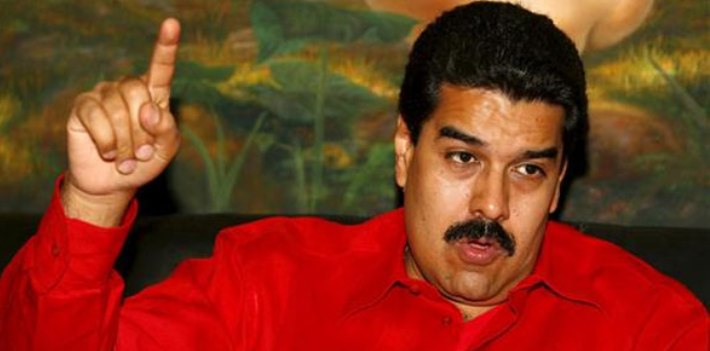
EspañolVenezuelan President Nicolás Maduro called off this week’s trip to Italy, citing “medical reasons” — a decision that kept him from meeting with Pope Francis and receiving a UN Food and Agriculture Organization (FAO) award for Venezuela’s “efforts to eradicate hunger.”
One wonders about the real motives behind Maduro’s no-show. Did he want to avoid an uncomfortable meeting with the pontiff, who would have pressured him to release Venezuela’s political prisoners? Or was the visit of the former Spanish Prime Minister Felipe González, attempting to support jailed opposition members, weighing on his mind?
It may be no coincidence that the president decided to cancel his visit to the Vatican on the same day that the opposition launched a nationwide campaign to ask Pope Francis to intercede for the political prisoners.
By staying in Venezuela — supposedly sick in bed — Nicolás Maduro has unsuccessfully tried to boycott González’s visit. He launched a smear campaign against him for his alleged interference in the country’s internal affairs, and prevented him from meeting with jailed opposition leaders such as Daniel Ceballos and Leopoldo López.
Before leaving the country on a Colombian plane, González managed to meet with the metropolitan mayor of Caracas, Antonio Ledezma, who has been under house arrest since the beginning of this year. However, he was not authorized to attend a hearing scheduled for Wednesday, which was eventually suspended.
Maduro’s motives remain cryptic. He may indeed have been suffering from severe flu and an ear infection. But in a regime that becomes more secretive and desperate with each passing day, one never knows the real motives behind the president’s behavior.
It’s not preposterous to think that the Venezuelan president’s stubbornness will let the hunger strikers starve to death.
However, it was left clear that Nicolás Maduro’s isolation from the democratic world has reached new levels, snubbing not only the four-term prime minister for the Spanish Socialist Workers’ Party, but also the spiritual leader of the Catholic Church.
Not only has the Venezuelan opposition demanded that the pope intervene — as did members of the opposition gathered outside the national office of the papal emissary in February — but a growing number of multilateral organizations and world leaders have requested the same.
For instance, the Club of Rome, a global organization composed of 107 former heads of state, recently wrote an open letter to the Argentinean pontiff saying that “in his vigorous defense of human dignity, he must demand that Venezuelan President Nicolás Maduro release political prisoners,” as well as “enforce the rights to social participation, freedom of press and speech … and hold fair and transparent elections.”
Maduro, however, has remained silent and avoided responding to any request. He even has refused an International Committee of the Red Cross (ICRC) mission to visit those political prisoners who are holding a hunger strike, joined by a growing number of activists outside of jail. “The total number of strikers totals 60 members of the opposition, including two young men stationed at the gates of the Vatican,” according to the opposition.
Meanwhile, Maduro has trumpeted his “human-rights doctrine,” as he called it in an interview with Russia Today in May. In Venezuela, he claimed, “there’s a new human-rights system that stems from the right to engage freely in politics and free-thinking, with a right to culture, democracy, and basic social rights,” he said.
“Venezuelans know perfectly well what rights they enjoy, beyond civil and political rights,” Maduro maintained.
But at the present moment, it’s not preposterous to think that the Venezuelan president will entrench and radicalize his position to such an extent that he lets the strikers starve to death, as the late Hugo Chávez did with farmer Franklin Brito in 2010, who died after months without sustenance in protest against the expropriation of his land. This would only increase domestic and international pressure, forcing him to either relent or sink deeper into isolation.
It wouldn’t be surprising for him to refuse to hold this year’s legislative elections, or at least to postpone them to 2016. The silence coming from the National Electoral Council, which has in recent years never failed to announce the date of polls less than six months in advance, raises this disturbing possibility.
This would be a risky and costly move, only postponing his problems and storing up resentment and anger among the public. Maduro is no general, like his military-minded predecessor claimed to be. But on his current trajectory, the leader of the so-called Bolivarian revolution is only marching deeper into a labyrinth of his own making.
 Versión Español
Versión Español












